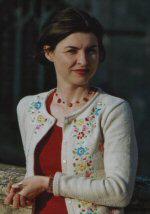Poem
Isobel Dixon
Weather Eye
Weather Eye
Weather Eye
In summer when the Christmas beetlesfilled each day with thin brass shrilling,
heat would wake you, lapping at the sheet,
and drive you up and out into the glare
to find the mulberry’s sweet shade
or watch ants marching underneath the guava tree.
And in the house Mommy would start
the daily ritual, whipping curtains closed,
then shutters latched against the sun
and when you crept in, thirsty, from the garden,
the house would be a cool, dark cave,
an enclave barricaded against light
and carpeted with shadow, still
except the kitchen where the door was open
to nasturtiums flaming at the steps
while on the stove the pressure cooker chugged
in tandem with the steamy day.
And in the evenings when the sun had settled
and crickets started silvering the night,
just home from school, smelling of chalk and sweat,
Daddy would do his part of it, the checking,
on the front verandah, of the scientific facts.
Then if the temperature had dropped enough
the stays were loosened and the house undressed
for night. Even the front door wide now
for the slightest breeze, a welcoming
of all the season’s scents, the jasmine,
someone else’s supper, and a neighbour’s voice –
out walking labradors, the only time of day
for it, this time of year. How well the world
was ordered then. These chill machines
don’t do it half as true, the loving regulation
of the burning days. Somehow my judgment isn’t quite
as sure when faced with weather-signs. Let me come home
to where you watch the skies and keep things right.
For Ann and Harwood
© 2001, Isobel Dixon
From: Weather Eye
Publisher: Carapace Poets,
From: Weather Eye
Publisher: Carapace Poets,
Poems
Poems of Isobel Dixon
Close
Weather Eye
In summer when the Christmas beetlesfilled each day with thin brass shrilling,
heat would wake you, lapping at the sheet,
and drive you up and out into the glare
to find the mulberry’s sweet shade
or watch ants marching underneath the guava tree.
And in the house Mommy would start
the daily ritual, whipping curtains closed,
then shutters latched against the sun
and when you crept in, thirsty, from the garden,
the house would be a cool, dark cave,
an enclave barricaded against light
and carpeted with shadow, still
except the kitchen where the door was open
to nasturtiums flaming at the steps
while on the stove the pressure cooker chugged
in tandem with the steamy day.
And in the evenings when the sun had settled
and crickets started silvering the night,
just home from school, smelling of chalk and sweat,
Daddy would do his part of it, the checking,
on the front verandah, of the scientific facts.
Then if the temperature had dropped enough
the stays were loosened and the house undressed
for night. Even the front door wide now
for the slightest breeze, a welcoming
of all the season’s scents, the jasmine,
someone else’s supper, and a neighbour’s voice –
out walking labradors, the only time of day
for it, this time of year. How well the world
was ordered then. These chill machines
don’t do it half as true, the loving regulation
of the burning days. Somehow my judgment isn’t quite
as sure when faced with weather-signs. Let me come home
to where you watch the skies and keep things right.
For Ann and Harwood
From: Weather Eye
Weather Eye
Sponsors

























